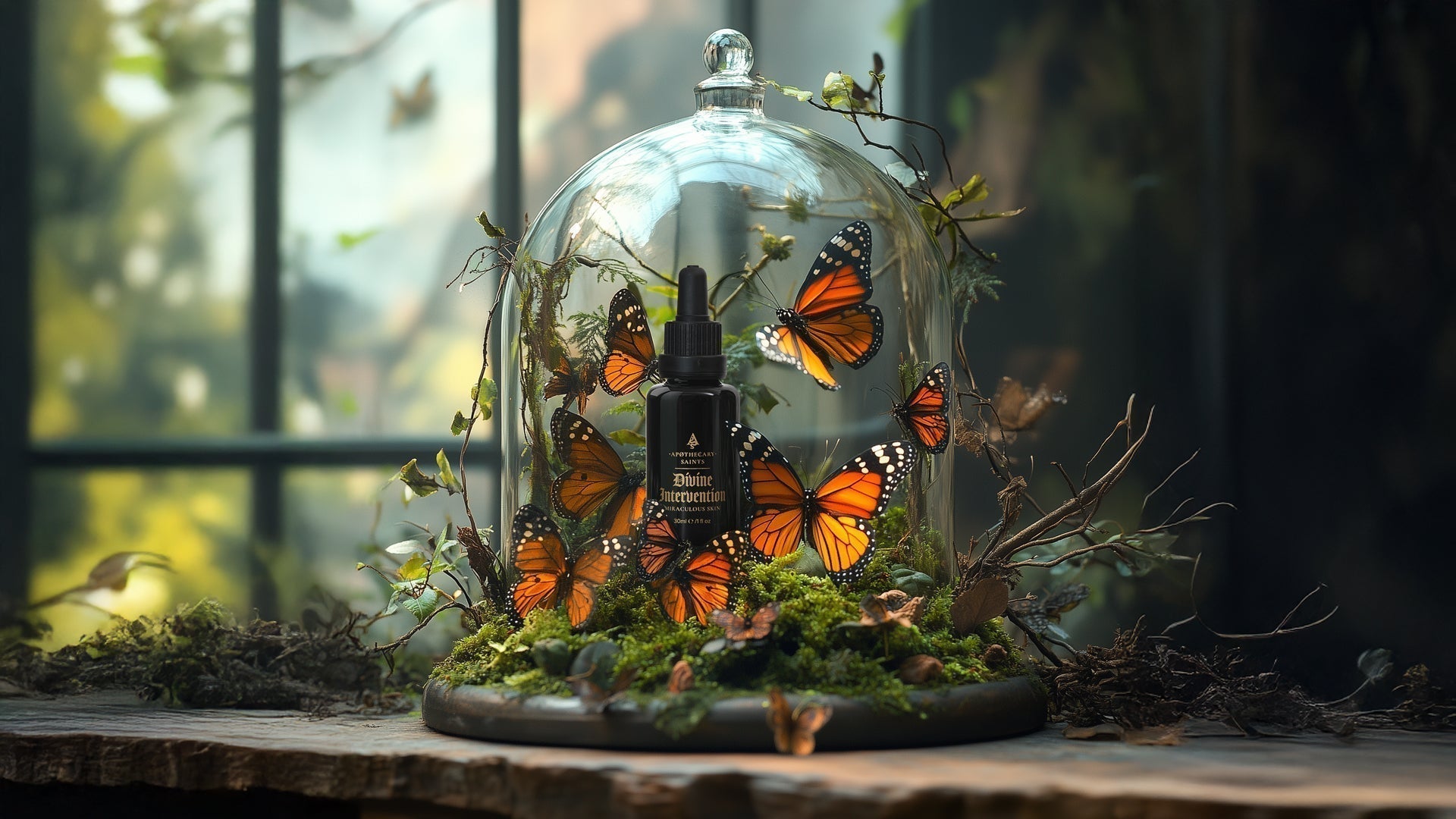
by Michelle Spina, L. Ac., MTOM, Creator of Divine Intervention, Co-Founder of Apothecary Saints
Why We Need to Rethink Skincare
In a world where skincare is synonymous with self-care, it’s easy to assume the products we consume are safe. But what if they’re not?
The skin absorbs approximately 60–65% of what is applied to it. While the EU has banned or restricted over 1,600 ingredients in cosmetics and skincare, the U.S. only restricts 11. Could these products be quietly undermining our health?
Many common ingredients in beauty and skincare cause rashes, over-drying, and even hormone disruption. The Wall Street Journal has reported that everyday chemicals may contribute to falling fertility rates—shrinking sperm counts and disrupting reproductive health. The Environmental Working Group found that 1 in 8 skincare products contains harmful ingredients, including hormone disruptors, allergens, and carcinogens.
What we put on our body matters as much as what we put in it. The evidence is alarming—and it’s time to make better choices.
What Are Endocrine Disrupting Chemicals (EDCs)?
Endocrine Disrupting Chemicals (EDCs) interfere with the body’s hormone system, which regulates development, metabolism, and reproduction. Found in plastics, cosmetics, and pesticides, EDCs mimic or block natural hormones like estrogen and testosterone.
This disruption can lead to:
-
Infertility and miscarriage
-
Early puberty and irregular cycles
-
Thyroid dysfunction
-
PCOS and endometriosis
-
Decreased sperm count, mobility, and DNA integrity
-
Impaired embryo implantation
Ingredients to Avoid in Skincare & Cosmetics
Phthalates
-
Found in shampoo, fragrances, and nail polish.
-
Block natural hormones, lower sperm count, suppress testosterone.
-
Linked to cancers, fertility issues, disrupted ovulation, and developmental problems in children.
Parabens
-
Preservatives in a wide range of products.
-
Mimic estrogen and are linked to breast cancer, obesity, thyroid disturbances, and DNA damage.
-
Frequently detected in human tissue and fluids.
BPA (Bisphenol A)
-
Common in plastic packaging, bottles, and containers.
-
Mimics estrogen, lowers testosterone, reduces sperm and egg quality.
-
Banned in the EU—highlighting the importance of clean packaging.
Fragrance
-
A 2010 study found each fragrance tested contained an average of 4 hormone disruptors.
-
Includes synthetic musks that mimic hormones and are linked to ovarian failure and infertility.
PFAS (“Forever Chemicals”)
-
Found in mascara, foundation, and even dental floss.
-
Linked to fertility problems, developmental delays, cancers, immune dysfunction, and obesity.
-
They accumulate in the body and environment, never breaking down.
Diethanolamine (DEA)
-
Used in cosmetics, detergents, and agriculture.
-
Linked to liver/kidney tumors, skin thickening, and carcinogenic byproducts when mixed with preservatives.
Talc
-
Common in powders and cosmetics.
-
May contain carcinogenic asbestos.
Sodium Lauryl/Laureth Sulfate (SLS/SLES)
-
Found in foaming cleansers, shampoos, and shower gels.
-
Disrupt the skin barrier for up to a week and act as endocrine disruptors.
Oxybenzone
-
Used in sunscreens.
-
Disrupts estrogen and androgen activity.
-
Also damages coral reefs and marine ecosystems.
The Apothecary Saints Difference
At Apothecary Saints, we believe beauty should never come at the cost of well-being.
Our flagship product, Divine Intervention, is crafted with 100% natural, clean ingredients. There are:
-
No fillers
-
No preservatives
-
No harmful chemicals
Only botanical wonders, hand-crafted and slow-brewed into unique batches that respect your skin and your health.
Take Action: Choose Clean Beauty
-
Check the labels on your products.
-
Use the Yuka app to decode ingredient lists.
-
Switch to clean, botanical alternatives—your body will thank you.
Apothecary Saints was created to introduce you to the botanical saints that nature provides for healing and nourishment.
🌿 Learn more at apothecarysaints.com or connect with us on Instagram @apothecarysaints
